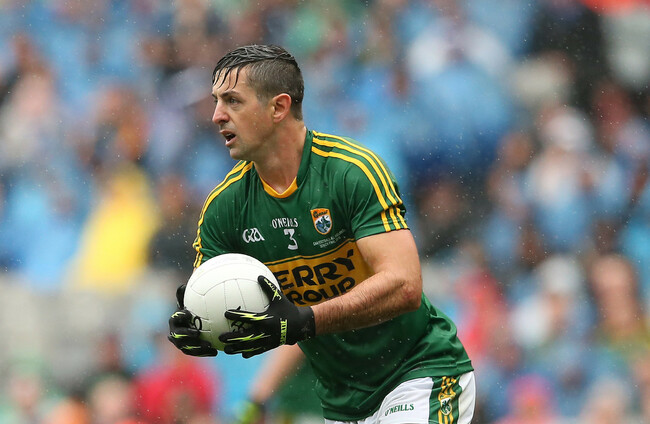THE FOLLOWING PASSAGE is an extract from ‘Unbroken’ by Aidan O’Mahony.
On 17 November the GAA released a statement saying that an unnamed player had supplied a positive drugs test. Players can be tested at training and after games when a urine sample is taken by someone from the GAA or WADA, the World Anti-Doping Agency.
That morning I got a text message telling me my name had been leaked: that I had been revealed as the unnamed player.
Reading that kind of message sends all sorts of thoughts through your head. You think of the consequences. Of losing your job, the reactions of your friends, your family.
The immediate question – how did this happen? – doesn’t even arise because the shock and the emotion are overwhelming.
My phone was hopping. I woke up in a panic, thinking that I had slept in, but when I looked at the phone I saw 89 missed calls, all backed up by text messages.
You’ll be named today as failing a drugs test.
You’ll have to come out and give your side of the story.
Variations on a theme.
The messages and calls kept coming through from lads I’d played with and against and journalists. To this day what doesn’t sit right with me was people texting me to talk to this journalist or that journalist – or not to talk to this one or that one. All looking for an insight.
In the days that followed I was advised to get in touch with Paul Derham, a solicitor in Cork who’s well known in rugby circles.
I knew Paul from working in the courthouse in Cork, and the first day I walked into his office he just told me to give him my side of the story.
He put me completely at my ease and was fantastic to deal with from start to finish.
Going to see him indicated to me how serious it was, but that lesson was sinking in anyway: the papers had photographs of me with ‘O’Mahony fails drugs test’ as a caption on the front page.
When I saw those papers delivered into my place of work it brought home the seriousness of the issue all over again. Thankfully, at work the whole situation was dealt with professionally: I explained my side of the story, and I got nothing but support in return.
Outside, it was a different story. It was a media frenzy. I could understand that, but what really annoyed me was that my name had been leaked.
That anger was compounded when I saw reports that I’d get a two-year ban, as though I’d already been found guilty without any due process.
On top of everything else, I’d been advised to say nothing, which was probably good advice at the time – but it had the effect of maybe making me look guilty.
Silence can be interpreted in a lot of different ways, and there were those who were happy to interpret my silence as confirmation of my guilt.
In my daily work, I met plenty of people who were not shy about making a comment about it, but I’d have felt that after the diving incident sympathy for me would have been in short supply anyway, so I buttoned my lip.
On 21 November I received a temporary ban until the hearing took place, and with no inter-county action to occupy people’s attention at that time of year, there was no shortage of commentary about my case in the papers and on radio and television.
It affected me. I have no problem saying that. If I thought the week of the Donncha O’Connor incident was bad, having to explain myself every single day was draining.
The case never seemed to conclude. The first hearing with the GAA’s anti-doping committee was fixed for 17 December in Dublin and one of my strongest memories of the whole experience was ringing the hotel where the meeting was taking place and asking them if I could get changed there beforehand.
The hotel staff went on and on about charging for this room and for that amount of time, and I was so keen to get it over with that I paid them for the night, even though I only needed five minutes to change my clothes.
Myself, Paul Derham and a doctor he enlisted were at the hearing, as was Dr Mike Finnerty, the Kerry team doctor, and Jerome Conway, the Kerry county board chairman. We were up before the GAA’s Anti-Doping Committee, which included a former GAA president, a doctor and a QC.
Paul’s instructions to me were simple: ‘Just tell them what you told me in the office that day.’
That was great to hear, as opposed to a lawyer saying, ‘Don’t say this and don’t mention that.’
At the meeting, Paul spoke, and then I was asked to speak.
I told the committee that I’d been an asthmatic for over 20 years, and that it was routine for me to use the inhaler every night before I went to bed.
With the nerves of a day like an All-Ireland final weighing on you it wouldn’t be unusual to wake up at three in the morning and to take a few puffs of it. I’d used it that morning before the game and during the game: I told them exactly how many times I’d used it.
I also pointed out that my name had been leaked, and that my anonymity was gone, but I also acknowledged that it was up to me to be aware of the guidelines when it came to salbutamol, the active ingredient in the inhaler.
Players get a therapeutic form at the start of the year and fill it out, and I’d stated on my form that I used the inhaler two to three times a day.
I told the committee that when I use my inhaler, I take two puffs each time and when they asked why I hadn’t clarified that and written that down, I accepted that that was my fault – that I should have done so, but that that was what I had been doing for the previous 20 years or so.
The hearing committee accepted my testimony completely. There was no apparent agenda and they took everything I said on board.
But then the whole thing was adjourned until after Christmas as they deliberated on it.
I waited and waited for the hearing’s outcome, constantly chasing county board officers for an update. I couldn’t even think about finding closure until the final verdict came out on 22 January.
I remember reading the committee’s conclusion that I hadn’t been trying to enhance my performance but had taken the salbutamol while using my inhaler.
I’d expected that finding, but it was still a relief.
In all the years I’d played, I’d have taken a few puffs of the inhaler if I’d felt a bit wheezy, as anyone who’s asthmatic would do.
I didn’t know there was a threshold to the amount of salbutamol you were allowed to have in your system, and that was my fault. I should have clarified how many puffs of the inhaler I was taking each time I was using it.
Carrying the tag of being the first player to fail a drugs test was bad enough, but the fact that it was due to the asthma, which I’d worked so hard to overcome as a young footballer … the irony wasn’t lost on me, put it that way.
When the whole thing was resolved I was flooded with messages from people who had asthma themselves – county players, club players and even kids who wanted to overcome the condition in order to play a sport they had a passion for. So in that sense, a lot of positivity came out of it.
Looking back at the whole thing now, I remember feeling as though the carpet had been pulled from under me. I think the entire matter was handled extremely poorly, and the leaking of my name to the press I still find frustrating and upsetting.
I couldn’t comprehend that there were GAA officials on the International Rules tour – officials I would have been in contact with throughout the trip – who, when I stood in front of them at the hearing, addressed me as if I was a stranger.
Unbroken by Aidan O’Mahony is published by Hachette Ireland and is available now, €14,99












Super attitude….Fair play to him and best of luck with the rehabilitation…. Others could learn a thing or two from people like Jamie
Great article and a Fantastic attitude to have , great to see , I wish him all the best in his recovery , his never say die attitude will help him so much ! A True warrior ..
Two things you can never reach is heart and determination .. It’s something this chap was born with
I sincerely hope all goes well Jamie. An unbelievable attitude to adversity. Hat tip to you .
Jamie if you were a cork minor and u21 you have the goods mentally and physically. All the very best with everything mate.
Inspirational stuff. Keep brave Jamie, you’re a credit to everything that is great about sport.
I hated reading this story to be honest. I find myself giving out about the smallest things in life. It is hard to believe this kind of thing can happen overnight especially to a person who was playing sport at the highest level. It just proves once again how fragile life is and how were here to live it. Keep the faith Jamie, you’ve given one person a different perspective for the future. Best of luck.
Inspirational young man. The very best of Luck to you.
Wow. inspiratonal.
An utterly remarkable attitude. So many of us could learn from this young man. Every good wish for your recovery I hope you achieve your goals
Inspirational stuff
Best of luck in your recovery Jamie your a brave young man, an inspiration and a credit to your family.
This guy really puts the “The only disability in life is a bad attitude” motto into practice. Great story and really hope he pulls through with his recovery!
We all need to not worry about the small silly things in life. From a fellow 21ish year old Jamie all the best in your recovery, your an absolute shining inspiration to everybody.
Great Athlete, incredible Man.
Absolute respect, big lad. You have the heart of a feckin lion. All the very best to you and your family.
Serious respect!
Jasmine your an inspiration to a doorway of possibilities. You are so brave and ambitious I bet in a while you will be much improved. Keep up the brilliant work.
What an inspiring article. Young people who ruin their lives with drink n drugs should spend 1 day with Jamie n it might open their eyes. Best of luck Jamie from all in Ballinhassig.
Just curious but why would people click RED on this article this guy has gone from leading a full physical active walking life to a complete change which I can’t even think what it must have been like for him. I hope all goes well for him Keep going wan’ts your attitude gives up then it’s a step back. I work with special needs children & adults i know how hard it can be for them to do simple things but they never give up & we as so called normal able bodied people could learn a lot from them. Keep going never give up.
Incredible resolve and inspirational story. Most people think they have regular (mostly petty) day to day problems but when you hear a story like Jamie’s it shows what true courage and determine really is! Best of luck bud!
Jamie you are inspirational . Keep the chin up and best of luck with everything in the future
Best of luck with your recovery Jamie. Children had great fun with you last Easter at hurling camp in Ballyvourney.
Hope to see with us again. From all in Laochra Og
Best of luck Jamie your an Inspiration from KILLAVULLEN GAA CLUB
Best of luck Jamie, Inspirational stuff ! great hurler with great attitude !
From one Kilbrittain man to another !
Excellent attitude! maybe I didn’t read it properly but is he still in a wheelchair?
Heroic attitude. Inspiration
Inspiring article ,what a brave young man , head up Jamie may God guide and protect you ,wishing you all the best for the future from all in the Kingdom
Truly remarkable attitude from this young man, he is a fine example of a human being. All the best with your rehabilitation, I’ll be praying that Plan A is not too far away.
Best of luck Jamie …slowly but surely is the motto…..you have a great attitude
Best wishes Jamie, here’s to the day we’re watching you playing in Croke Park!
What an honest interview. I wish Jamie the best of luck for his future and I wish him good Karma.
Best of luck in your recovery, Dunlaoirthe is the best place in the country to get better. Not not only have the rebels but the whole country behind you…
Jamie you are an inspiration to us all…and only 21 years..what maturity..I hope and pray that you will be back on your feet before too long..
Know this young man’s family, all top drawer. If ever there was someone who could beat this it’s Jamie Wall. Our thoughts are with you all.
Stay positive jamie you will get dark days and fed up , and the why me .. you are a inspiration strong in mind , heart and determination. .praying for you xx
Great article Jamie- inspirational stuff. Well done